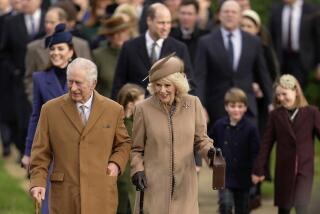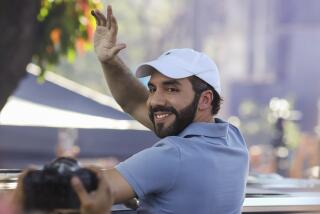Morocco’s king proposes constitutional reforms
Attempting to stave off democratic demands sweeping the Arab world, Morocco’s King Mohammed VI unveiled a draft constitution that includes major reforms to strengthen the role of the elected government, apparently strip him of some powers, and enshrine equality of the sexes and civil liberties in a country with a dark history of human rights abuses.
But under the proposed constitution, to be voted on by the nation in a July 1 referendum, the king would retain the power to approve Cabinet appointments, as well as maintain authority over the security apparatus, army and key religious posts. That means the draft is unlikely to meet with widespread approval of an increasingly unified and confident opposition movement inspired by the revolutions in Tunisia and Egypt.
“As perfect as it may be, a constitution is never an end in itself, but rather a means for the establishment of democratic institutions,” the king said late Friday in a much-anticipated speech broadcast live in Morocco and on seemingly every news channel in the Arab world. “The latter require reforms and political overhauling in which all stakeholders should take part so as to achieve our shared ambition, namely to promote development and enable all our citizens to lead a dignified life.”
The proposed constitution could carry major implications for other Arab monarchies, including Jordan and the oil-rich states of the Arabian Peninsula, under pressure by a wave of democratic movements in North Africa and the Middle East. The king’s proposals also show how the demands for political change across the region are playing out differently in various countries.
Among the proposed changes: A president, appointed by the king from a popularly elected political party, would have authority to appoint or fire ministers and governors, an authority previously held by the king. The constitution would also strengthen the elected parliament’s ability to draft and propose laws, and would bolster the independence of the judiciary, according to the king.
The draft also designates Amazigh, the language of the country’s Berbers, as an official language alongside Arabic — a major concession to a long-beleaguered group.
“The constitution gives the head of government the power to propose and dismiss Cabinet members, to steer and coordinate government action, and to supervise public service,” the king told Moroccans.
“The draft constitution confirms the commitment to all human rights, especially the presumption of innocence and guaranteeing the conditions for a fair trial. It criminalizes torture, enforced disappearance, arbitrary detention and all forms of discrimination and inhuman, degrading practices,” he said. “The draft constitution also upholds freedom of the press and of expression and opinion, as well as the right to access information and to submit petitions.”
But activists said the constitution was drafted behind closed doors with a top-down approach that excluded the involvement of ordinary people. Though Mohammed pledged the independence of the country’s judiciary, sentences will still be handed in the name of the king, giving him final imprimatur on the entire justice system.
The king also retains the power to dissolve parliament after consulting with a newly created constitutional court, half of which he would appoint.
“The main thing is the separation of powers, the king holding all the powers over the government,” said Najia Myrtus, co-founder of Moroccans for Change, a U.S.-based website that monitors developments in the country. “The activists want separation of powers so that the people have more power and are better represented. The king didn’t give up much of that. The king still appoints parts of the government.”
Activists also doubt the reforms will be implemented even if the constitution is enacted, citing previous backslides after promises of reform. They predicted that weekly protests demanding reform would continue.
FOR THE RECORD:
Morocco reforms: This article refers to a Moroccan blogger as “Bin Kafka.” The blogger in fact goes by Ibn Kafka.
“It’s far from enough,” said activist and lawyer Bin Kafka, the nom de plume of a well-known Moroccan blogger, who was reached by telephone.
“There are a few positive steps, but they are very limited compared to what the protest movement requested — parliamentary monarchy, the end of the impunity that has been enjoyed by the security forces when it comes to torture and forced disappearances,” said the blogger, who asked to keep his real identity anonymous for fear of jeopardizing his professional status. “The basic rules of the game remain the same.”
On the other hand, many were supportive of proposals that strengthened the rights of women and Berbers, who make up at least 40% of Morocco’s population. “There’s a lot of excitement about that,” said Myrtus. “That’s a huge issue. Being a Berber myself, that means a lot to me.”
Morocco, a North African nation of 32 million people with strong security and historical ties to the U.S. and commercial and cultural ties to the European Union, suffers from widespread income disparity, illiteracy and what some describe as social and political malaise.
It has been ruled by the same monarchical dynasty since the 17th century. Young and modern, Mohammed VI came to power in 1999 after the repressive, decades-long rule of his father, Hassan II, who jailed and tortured dissidents and turned Morocco into one of the world’s worst human rights abusers. Mohammed launched swift democratic reforms and even allowed the formation of a truth commission to investigate past abuses.
But critics say he has backslid in recent years. Newspapers have been shuttered and dissidents harassed. His regime has been accused of indulging in the same type of crony capitalism that afflicted the administrations of deposed presidents Hosni Mubarak of Egypt and Zine el Abidine ben Ali of Tunisia.
Unlike Syrian President Bashar Assad or Libya’s Moammar Kadafi, the 47-year-old king, who is generally popular even among the opposition, has largely allowed a series of peaceful weekly protests to unfold, especially in the capital, Rabat, and the commercial center, Casablanca.
The protests, which began Feb. 20, have been gathering momentum as Islamists, intellectuals and trade unionists have put aside their differences to demand sweeping reform rather than revolution.
More to Read
Start your day right
Sign up for Essential California for news, features and recommendations from the L.A. Times and beyond in your inbox six days a week.
You may occasionally receive promotional content from the Los Angeles Times.






